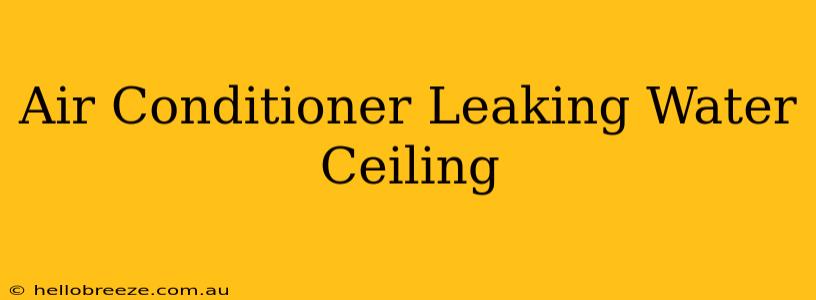Is your air conditioner leaking water onto your ceiling? This is a serious problem that needs immediate attention to prevent further damage to your home and potential health hazards from mold and mildew. This guide will help you understand why your AC is leaking, how to troubleshoot the problem, and when you need to call a professional.
Common Causes of AC Leaks Leading to Ceiling Damage
Several factors can contribute to your air conditioner leaking water and causing ceiling damage. Let's explore the most common culprits:
1. Clogged Drain Line:
This is the most frequent cause of AC leaks. The condensate drain line, responsible for removing excess moisture from the air, can become clogged with algae, mold, or debris. When this happens, water backs up and overflows, often finding its way into your ceiling.
Solution: Try flushing the drain line with a mixture of water and bleach to clear clogs. You can often access the drain line from the unit's access panel. If you're not comfortable doing this yourself, call an HVAC professional.
2. Frozen Evaporator Coil:
A frozen evaporator coil restricts airflow, preventing proper drainage and causing water to accumulate and leak. This freezing often results from:
- Restricted Airflow: Dirty air filters, clogged vents, or restricted airflow around the unit can lead to freezing.
- Low Refrigerant: Low refrigerant levels affect the cooling process, causing the coil to freeze.
- Dirty Air Filter: A clogged air filter significantly reduces airflow. Regular filter changes are crucial for preventative maintenance.
Solution: Check and clean your air filter. If the coil is frozen, turn off the unit and allow it to thaw completely. Low refrigerant requires professional attention.
3. Condensation Pan Issues:
The condensation pan collects the water before it drains. If the pan is cracked, corroded, or improperly positioned, it can leak. A clogged drain line, as mentioned earlier, can also lead to an overflowing condensation pan.
Solution: Inspect the pan for cracks or damage. If damaged, it will need replacement. Ensure the pan is correctly aligned.
4. Leaking Condensation Drain Line Connections:
Loose or disconnected drain line connections are another potential source of leaks. The water may leak from the joints, traveling unnoticed until it damages your ceiling.
Solution: Carefully inspect all connections for tightness and secure any loose fittings.
5. Improper Installation:
In some cases, the air conditioner may have been improperly installed, leading to drainage problems. This is less common if the unit was professionally installed.
Preventing Future Leaks and Ceiling Damage
Regular maintenance is vital in preventing AC leaks and safeguarding your ceiling:
- Clean or replace air filters regularly (at least monthly). This is the single most important preventative measure.
- Schedule annual professional AC maintenance. A technician can identify and address potential problems before they escalate.
- Inspect the drain line occasionally. This helps you catch clogs early.
- Address any leaks promptly. Don't ignore even minor leaks, as they can worsen quickly.
When to Call a Professional HVAC Technician
If you've tried troubleshooting the problem and the leak persists, it's essential to call a qualified HVAC technician. They have the expertise to diagnose complex issues, such as refrigerant leaks or faulty components, and perform necessary repairs. Ignoring a persistent leak can lead to significant damage and costly repairs down the line. Don't hesitate to seek professional help to protect your home and your investment.
Remember, dealing with an air conditioner leaking water onto the ceiling is a time-sensitive matter. Swift action can prevent extensive water damage and costly repairs.

